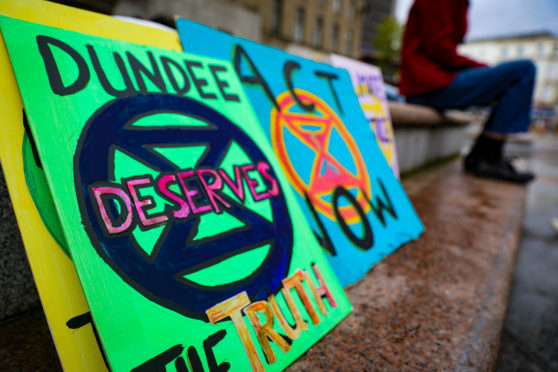This year will see Scotland take centre stage of the great climate change debate, with the United Nations’ COP26 Climate Conference being held in Glasgow.
The city will welcome delegates from all over the world in November, with around 30,000 people expected to attend.
This will be the largest summit the United Kingdom has ever hosted.
The police will be put under pressure during this period, with extra funding being put into ensuring the event is safe and sufficiently policed.
However, as groups like Extinction Rebellion work to raise awareness and hold key perpetrators accountable for their contribution to climate change despite having recently been added to a terror threat list in the UK, the hope for climate justice is declining.
Although there are other groups working towards that goal, the impact of their actions must be great enough to prevent further environmental degradation as we must reduce carbon dioxide emissions by 2030 to 45% less than they were in 2010.
Large states such as the United States, China and Russia are “critically insufficient” in how they operate in terms of climate action, according to the Climate Change Performance Index, so the likelihood of this target being met is highly unlikely. This will contribute to a rise in climate-based migration.
Indeed, Brexit isn’t the only pressing issue that will be affecting rates of migration and immigration to and from Britain in the months and years ahead. The last General Election saw the climate crisis being put at the front of many party campaigns as a response to the public’s concern over a national plan in relation to tackling the climate crisis.
Our unsustainable habits, on a small scale, such as single-use plastic consumption, water wastage and excessive consumption of meat and poultry, have resulted in extreme changes in the Earth’s core temperature which has in turn resulted in the failure of many eco-systems and natural protective barriers.
We have seen this recently with extreme weather conditions across the globe. The horrific bush fires in Australia, the increased occurrence of flooding through the Indian subcontinent, such as the devastating floods in the state of Kerala which displaced thousands of Indians, have all indicated that with this extreme change in weather conditions, migration is an inevitable consequence.
Due to these changes, we could soon see the UK needing to open their borders to migrants that have been produced by climate changes. Many have already been displaced throughout Asia, with many Indonesian islands becoming uninhabitable due to rising sea levels.
However, we should not consider ourselves to be immune to not only the intake of these migrants but also consider the prospect of our becoming climate migrants.
Britain is, of course, an island and rising sea levels have already contributed to more flooding as has been seen in England.
Likewise, Scotland will also see the consequences of climate change, perhaps not as drastically with rising sea levels but when immigration rates increase.
Natural weather conditions changing across the globe has resulted in multiple island nations facing the threat of displacement.
As many coastal regions of countries across the globe have started to encounter the results of these changes, the likelihood of Britain experiencing these changes is also likely to increase.
The heavy rain and high tides that have been predicted for Dundee and Angus, which could result in coastal flooding, are prime examples of how this change in weather will affect Scotland as well as other coastal towns and regions.
One of the greatest examples of climate change-based migration was that of the mass migration which came with the aftermath of Hurricane Katrina, which hit the Gulf Coast of the USA in the summer of 2005.
The Intergovernmental Panel on Climate Change (IPCC) has stated that ‘in the mid- 1990s it was widely reported that up to 25 million people had been forced from their homes and off their land by a range of serious environmental pressures, including pollution, land degradation, droughts and natural disasters’, further supporting the idea that changing weather conditions will only result in an increased rate of migration and ‘environmental refugees’.
Professor Norman Myers from the IPCC, in the IOM Migration and Climate Change Report, estimated there will be “200 million climate migrants by 2050” a figure “which has become accepted… representing a ten-fold increase over today’s entire documented refugee and internally displaced populations.” Climate change, if not reversed or rectified in the near future, is predicted to expel millions from their homes, to nations which can accommodate these refugees who will be forced out of their homes at no fault of their own.
Alongside nations and islands that we may be disassociated from, the changes in climate and the rising sea levels will soon become an issue that all coastal regions will 2start to face as the century progresses. According to analysts such as Scott Kulp and Benjamin Strauss, climate change has driven the ‘global mean sea level to rise by 11-16 cm in the twentieth century’. Although 11-16 cm may seem generic, natural or insignificant to many, these changes in sea level will be detrimental for not only islands such as Papua New Guinea, Sri Lanka and Indonesia but will also soon affect the UK.
Many Britons forget we are very susceptible to high tides and coastal flooding. This flooding, although unfortunately having become a common occurrence, is a result of high carbon emissions, sea levels rising due to an increase in the overall global temperature, hence resulting in the water boundaries of our coasts rising to a level which results in the flooding that we have seen.
That should all make this year’s UN conference feel very close to home.
Shivani Trivedi: Third Year Politics and International Honours Student at University of Dundee.
Co-authors:
Ian Roache: Researcher and tutor in Politics and International Relations at University of Dundee.
Dr Abdullah Yusuf: Lecturer in Politics and International Relations at University of Dundee.










